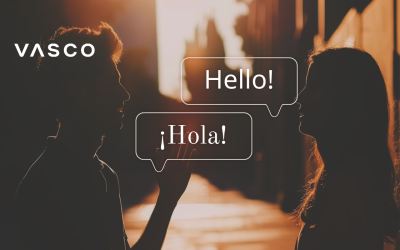This is not another article about how to recognize and deal with fake friends in your life. Here, we’ll talk about a different kind of struggle. Anyone who learns a foreign language needs to watch out for so-called false friends. No, they are not people who try to sabotage your effort by giving harmful advice. Let’s just say for now that they cannot be treated lightly and can cause very serious problems in communication. In this article, we’ll get into some details about this phenomenon and find false friends in various languages.
Having read this article, you’ll know:
- The Definition of the term “false friends”.
- When it first appeared in linguistics.
- How false friends are created.
- Some popular examples of false friends.
FAQ:
What is an example of a false friend?
What is the false friend rule?
How do you deal with false friends?
What are false friends in translation examples?
Are false friends words in a foreign language?
The definition of the term “false friends”
False friends can be simply described as words from various languages that are very similar in sound and spelling, but very different in meaning. We’ve mentioned before that they can cause very serious problems in communication. To illustrate this, let’s look at the expression čerstvé pečivo in the Czech language. There, it means fresh bread. However, there’s also a very similar phrase in Polish: czerstwe pieczywo, but there it means something vastly different — the bread is stale. See how careful you need to be? You probably do. So let’s now get into some linguistics.
Origins of the term
This term “false friends” was first introduced by Maxime Koessler and Jules Derocquigny in their 1928 book called Les Faux Amis, ou les Trahisons du Vocabulaire Anglais (which translates as False Friends, or the Betrayals of English Vocabulary). The term appears as faux amis du traducteur (false friend of a translator). However, it is its shortened version that gained popularity and became an official term used in linguistics.

How are false friends created?
False friends, also known as bilingual homophones, can be created in various ways. They can appear, for instance, as a result of shared etymology. If, let’s say, 3 languages inherited a word from a common ancestor and its meaning changed over time in at least one of them, we will face a false friend (being a native speaker of either one of the 2 remaining languages, of course).

To illustrate the above, let’s take a closer look at the word friend itself. We know what it means in English, and we know that the German equivalent freund has the same meaning. But in Danish (frænde) and Swedish (frände) it means a relative. All these words were inherited from a Proto-Germanic ancestor that roughly means someone that you care for. However, the English and German versions have lost the “relative” part of the meaning along the way. What’s more, false friends may also be the result of homonymy. In linguistics, homonyms are words that have the same spelling, irrespective of their pronunciation (homographs), or share the same pronunciation, regardless of spelling (homophones). Homonyms can also be both homographs and homophones.

To illustrate this, let’s take a look at the Scandinavian word rolig. In Swedish, it means fun, but in Danish and Norwegian — calm. Another example is semester, which in Danish and Norwegian means a school term, but in Swedish — holidays. The latter case is especially interesting because of how distant the meanings actually are! Another linguistic phenomenon that may result in false friends is called pseudo-anglicism. These are new words created from English morphemes that may appear to be English, but in fact, do not exist in this language’s vocabulary. An example of such may be the Japanese word salaryman (サラリーマン), which signifies an office worker. Even more, the word Pokémon (ポケモン) is also a pseudo-anglicism and means a pocket monster. However, when it comes to specific examples of false friends, let’s take a closer look at the Polish word dres (a tracksuit). It is derived from the English dress or which, as a noun, means “complete style of clothing” and as a verb — to put clothes on (Free Dictionary). We can see the connection between the meanings of both Polish and English words.

Examples of false friends in various languages
Let’s now focus on some popular examples of false friends. First, we’ll take a look at French and English.
French and English
The word affair in English means a romance. However, there is a very similar word in French, affaire, which signifies something completely different — a business or a matter to attend to. Another instance of false friends may be actually and actuellement. In English, it means in fact, but the French word signifies right now. More words that are similar in sound and different in meaning are to attend and attendre. The first one means to be present at an event, and the latter — to wait. There’s also a significant difference in the meaning of caution and French caution. The English word means carefulness or awareness, however, the French version of this homograph signifies bail or guarantee.
Word 1 |
Language |
Meaning |
Word 2 |
Language |
Meaning |
|---|---|---|---|---|---|
| Affair | English | Romance | Affaire | French | Business or a matter |
| Actually | English | In fact | Actuellement | French | Now |
| To attend | English | Be present at an event | Attendre | French | To wait |
| To bless | English | Praise / honour / consecrate | Blesser | French | To injure / hurt / wound |
| Caution | English | Carefulness / awarness | Caution | French | Bail or guarantee |
| Chips | English | Fries | Chips | French | Crisps |
| To charge | English | Ask for a fee | Charger | French | To load |
| Cave | English |
A natural underground cavity |
Cave | French | Cellar |
| Race | English | Competition | Race | French | Breed (animals) |
| Patron | English | Sponsor | Patron | French | Boss |
| To rest | English | Relax / Pause | Rester | French | To stay / To remain |
| Competition | English | Opponent | Compétition | French | Tournament |
| Dramatic | English | Spectacular | Dramatique | French | Terrible / Tragic |
| Library | English | A facility containing collections of books |
Librairie | French | Bookstore |
Spanish and English
Let’s move on to Spanish and English. The Spanish word abogado is very similar to the English avocado, but doesn’t signify this delicious fruit. It actually means a lawyer. Another example of false friends in Spanish and English may be the word campo. It is very similar to the English word camp, but in the first language, it means a countryside or a field. Other two similar words in these languages are also despertar and desperate – in Spanish, it means to wake up.
Word 1 |
Language |
Meaning |
Word 2 |
Language |
Meaning |
|---|---|---|---|---|---|
| Avocado | English | A vegetable | Abogado | Spanish | Lawyer |
| Bomber | English | One who uses a bomb | Bombero | Spanish | Firefighter |
| Camp | English | Bivouac | Campo | Spanish | Countryside |
| Current | English | Actual | Corriente | Spanish | Stream |
| Actually | English | In reality | Actualmente | Spanish | Currently |
| Carpet | English | Rug | Carpeta | Spanish | Folder |
| Desperate | English | Hopeless | Despertar | Spanish | To wake up |
| College | English | University | Colegio | Spanish | High School |
| Exit | English | Way out | Éxito | Spanish | Success |
| Embarassed | English | A feeling | Embarazada | Spanish | Pregnant |
German and English
Last but not least, let’s take a look at false friends in German and English. The words bald and bald are homographs, but their meanings are vastly different. In the first language, it means soon. A pair of popular false friends is become and bekommen. The latter actually means to get. Also and also are homographs, but the German word signifies therefore. More examples of false friends in German and English are brave and brav (courageous and well-behaved), chef and chef (cook and boss), as well as fast and fast (quick and almost).
Word 1 |
Language |
Meaning |
Word 2 |
Language |
Meaning |
|---|---|---|---|---|---|
| Bald | English | Hairless | Bald | German | Soon |
| Become | English | Will be | Bekommen | German | Get |
| Also | English | Too | Also | German | Therefore |
| Apart | English | Not together | Apart | German | Fancy, interesting |
| Art | English | Fine art | Art | German | Species, a kind of |
| Billion | English | Billion | Billion | German | Trillion |
| Brave | English | Courageous | Brav | German | Well-behaved |
| Brief | English | Short | Brief | German | Letter |
| Chef | English | Cook | Chef | German | Boss |
| Dose | English | Amount | Dose | German | A can |
| Fast | English | Quick | Fast | German | Almost |
| Gym(nasium) | English | Sport facility | Gymnasium | German | High School |
| Happen | English | Take place | Happen | German | A bite |
| Hell | English | Opposite of heaven | Hell | German | Bright |

Miscellaneous
Polish and English
Word 1 |
Language |
Meaning |
Word 2 |
Language |
Meaning |
|---|---|---|---|---|---|
| Actually | English | Indeed | Aktualnie | Polish | Currently |
| Accord | English | Agreement | Akord | Polish | Chord |
| Bark | English | Woof or speak angrily | Bark | Polish | Part of a body |
| Hen | English | Animal | Hen | Polish | Far away |
| Blanket | English | Comforter | Blankiet | Polish | Blank form |
| Car | English | Automobile | Car | Polish | Imperial ruler |
| Cap | English | Head cover | Cap | Polish | Male of goat or sheep |
| Brat | English | Naughty child | Brat | Polish | Brother |
| Fart | English | Break-wind | Fart | Polish | Luck |
| Hurt | English | Harm | Hurt | Polish | Wholesale |
Czech and English
Word 1 |
Language |
Meaning |
Word 2 |
Language |
Meaning |
|---|---|---|---|---|---|
| Action | English | Activity | Akce | Czech | Event, Promotion |
| Brigade | English | An army unit | Brigáda | Czech | Part time job |
| Chef | English | Cook | Séf | Czech | Boss |
Hungarian and English
Word 1 |
Language |
Meaning |
Word 2 |
Language |
Meaning |
|---|---|---|---|---|---|
| Chair | English | Szék | Cser | Hungarian | Beech tree |
| Look | English | Nézd | Lyuk | Hungarian | Hole |
| Link | English | Kapcsolat | Link | Hungarian | Negligent |
| Ad | English | Hirdetés | Ad | Hungarian | Take |
| Many | English | Sok | Menni | Hungarian | Go |
| Wear | English | Viselet | Ver | Hungarian | Hit |
| Coach | English | Edző | Kocs | Hungarian | Village |
| Less | English | Kevésbé | Lesz | Hungarian | Will be |
| Let | English | Hagyni | Lett | Hungarian | Latvian |
| Level | English | Szint | Levél | Hungarian | Brief |
| Wise | English | Bölcs | Víz | Hungarian | Water |
Italian and English
Word 1 |
Language |
Meaning |
Word 2 |
Language |
Meaning |
|---|---|---|---|---|---|
| Argument | English | Argument | Argomento | Italian | Topic |
| Library | English | Library | Libreria | Italian | Bookshop |
| Parents | English | Parents | Parenti | Italian | Relatives |
| Camera | English | Camera | Camera | Italian | Room |
| Confidence | English | Confidence | Confidenza | Italian | Intimacy, familiarity, closeness |
| Editor | English | Editor | Editore | Italian | Publisher |
| Estate | English | Estate | Estate | Italian | Summer |
| Novel | English | Novel | Novella | Italian | Short story |
| Romance | English | Romance | Romanzo | Italian | Novel |
| Patent | English | Patent | Patente | Italian | Driving license |
| Annoy | English | Annoy | Annoiare | Italian | Bore / get bored |
| Actually | English | Actually | Attualmente | Italian | Currently |
Romanian and English
=
Word 1 |
Language |
Meaning |
Word 2 |
Language |
Meaning |
|---|---|---|---|---|---|
| Crap | English | Excrement | Crap | Romanian | Carp fish |
| Jar | English | Glass recipient | Jar | Romanian | Burning coal or wood |
| Ban | English | Interdiction | Ban | Romanian | Money, Coin |
| Bucket | English | Receptacle | Buchet | Romanian | Flower bouquet |
| Fabric | English | Cloth | Fabrică | Romanian | Factory |
| Pregnant | English | Being with child | Pregnant | Romanian | That stands out, Noticeable |
| Sever | English | To split, cut in half | Sever | Romanian | Harsh, Strict |
| Advertisment | English | Ad, Commercial | Avertisment | Romanian | Warning |
| Camera | English | Photo camera | Cameră | Romanian | Room |
| Magazine | English | Publication | Magazin | Romanian | Store, Shop |
| Parcel | English | Package | Parcelă | Romanian | A piece of land |
| Far | English | At distance | Far | Romanian | Lighthouse |
| Hat | English | Cap | Cap | Romanian | Head |
| Chin | English | Body part | Chin | Romanian | Torment |
| Comma | English | Punctuation mark | Comă | Romanian | Coma, To be in a coma |
| Cutie | English | Pretty | Cutie | Romanian | Box |
| Glass | English | Material or bottle or recipient to drink | Glas | Romanian | Voice |
| Rest | English | Sleep, relax | Rest | Romanian | Money received as change |
Slovak and English
Word 1 |
Language |
Word 2 |
Language |
Meaning |
|
|---|---|---|---|---|---|
| Action | English | Measure | Akcia | Slovak | Event, Promotion |
| Brigade | English | Unit | Brigáda | Slovak | Part time job |
| Chef | English | Cook | Séf | Slovak | Boss |
| Concrete | English | A building material | Konkrétny | Slovak | Particular |
| Evidence | English | Proof | Evidencia | Slovak | Register |
| Gym(nasium) | English | A room or building equipped for gymnastics | Gymnázium | Slovak | High School US / Grammar School UK |
| Host | English | Proprietor | Hosť | Slovak | Guest |
| List | English | A file with index | List | Slovak | Letter, Leaf |
| Maturity | English | Adulthood | Maturity | Slovak | School leaving exam |
| Plot | English | Story | Plot | Slovak | Fence |
| Step | English | Tread | Step | Slovak | Tap dance |
| Invalid | English | Not valid | Invalid | Slovak | Disabled person |
| Smoking | English | Verb form of smoke | Smoking | Slovak | Tuxedo |
| Reproduction | English | Duplication | Reproduktor | Slovak | Speaker |
| Rifle | English | Gun | Rifle | Slovak | Jeans |
| Grapes | English | Small vune fruit | Grep | Slovak | Grapefruit |
False friends — Summary
Now, you know what false friends are and that they cause problems when learning foreign languages. If we just assume a meaning of a false friend, we may embarrass ourselves when speaking a foreign language. So, it is crucial to check the meaning of each and every word that we stumble across when learning a foreign language. However, if you don’t feel like doing it, you can always use Vasco Translator device. Thanks to its cutting-edge features, you will understand as many as 108 languages all around the world. However, with Vasco, you also have the option to learn foreign languages. Choose from 28 different tongues and study vocabulary along with pronunciation. False friends won’t cause you trouble anymore!
In a nutshell:
False friends are words from various languages that are very similar in sound and spelling, but very different in meaning. They can cause very serious problems in communication. The term “false friends” was first introduced by Maxime Koessler and Jules Derocquigny in their 1928 book called Les Faux Amis, ou les Trahisons du Vocabulaire Anglais (which translates as False Friends, or the Betrayals of English Vocabulary). False friends are created in various ways. They can appear, for instance, as a result of shared etymology. If, let’s say, 3 languages inherited a word from a common ancestor and its meaning changed over time in at least one of them, we will face a false friend (being a native speaker of either one of the 2 remaining languages, of course).











